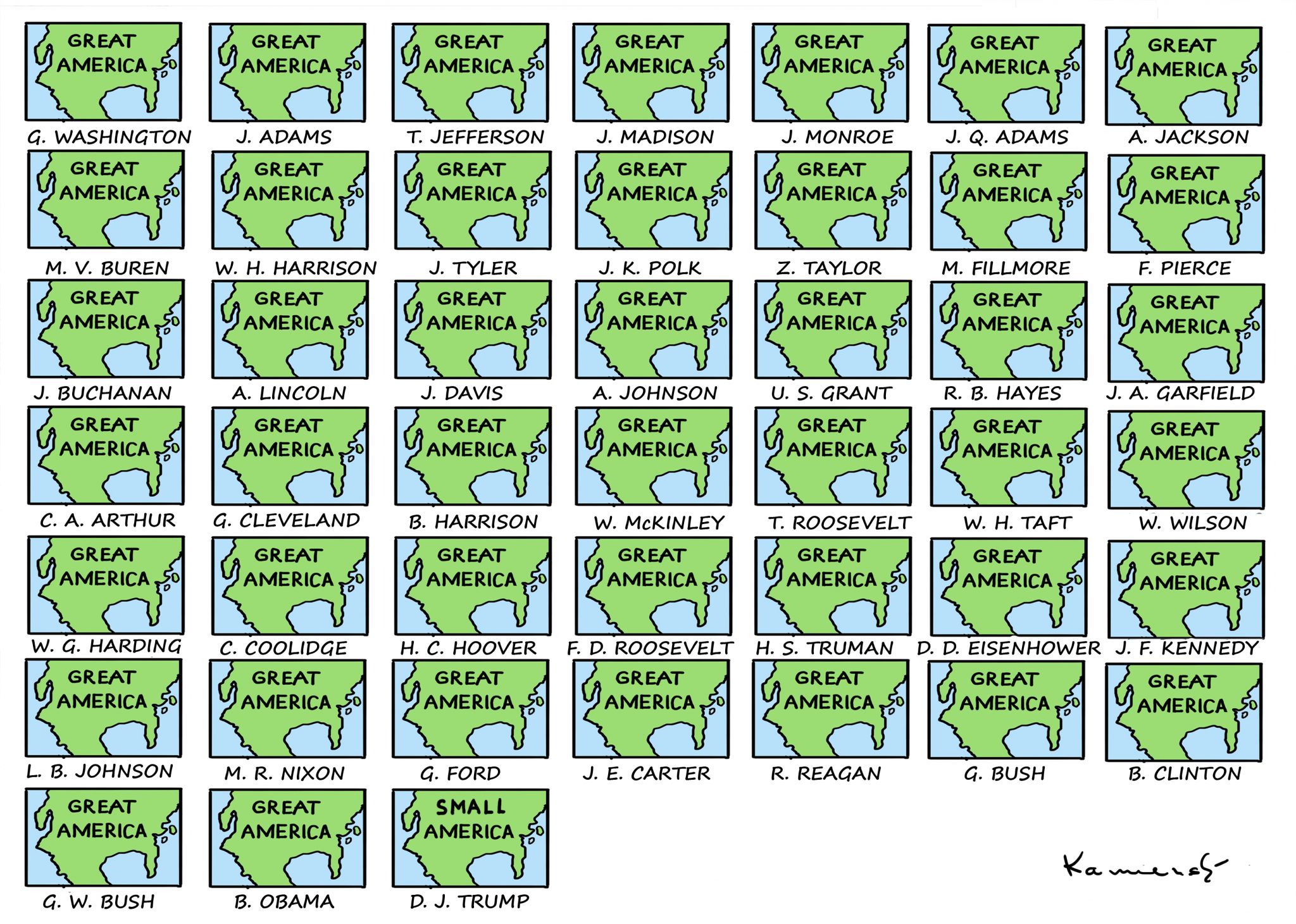BY VERN TURNER
 The United States has just inaugurated its 45th president. Donald Trump’s campaign line was Make America Great Again. Many of us who watch such key indicators as job growth and the stock market shook our heads and wondered what he was talking about. The key indicators were doing very well across the board and had been trending upward since the election and re-election of Barack Obama. So, when did we become not great?
The United States has just inaugurated its 45th president. Donald Trump’s campaign line was Make America Great Again. Many of us who watch such key indicators as job growth and the stock market shook our heads and wondered what he was talking about. The key indicators were doing very well across the board and had been trending upward since the election and re-election of Barack Obama. So, when did we become not great?
When World War II ended, our economic and manufacturing powers were the Colossus astride the rest of the world. We were indeed the arsenal of democracy. We supplied every allied country with materiel, food, medicine and machines in overwhelming abundance; the allies basically overwhelmed the German Wehrmacht and the Japanese Imperial military.
The only other country that came close to growing their industries to such an extent was the Soviet Union. Of course, they had to also move their entire industrial base 1,500 miles east, over the Ural mountains, in order to escape the German juggernaut. These were the kind of community and national efforts and vigor of which humans were capable, we discovered.
Nobody had any idea how many airplanes, tanks, ships and guns we could produce. But the relatively new science of industrial engineering streamlined every step of every piece of manufacturing such that production soared in the triple-digit percent range from 1939 [when we first realized Europe needed some serious help] until the end of the war.
The numbers were, and still are, stupefying in their scope. Keep in mind that in the mid-1940s, the population of the United States hadn’t yet reached 150 million. At the peak of the war, we had perhaps 25 million men and women in uniform, most of them men, and most of them skilled in one form of manufacturing or another.
As with most major wars throughout history, the women of the United States and the Soviet Union stepped up to fill in for the men gone to war. The women of both countries stepped in and stepped up in the most dramatic way ever. With their husbands, sons and boyfriends off to war, they taught themselves the skills necessary to build the tools of war that brought their men back home to them. Sadly, of course, not all of them did come home, but the women who worked in the defense plants who did lose someone to the war, worked just as hard to help bring home their neighbor’s husband, son or boyfriend. It doesn’t get much more vigorous than that.
Still, with all the activities creating the second industrial revolution, the capitalists did what they have always done. They worked very hard to maximum profits at all costs. The infamous cost-plus government contract was used and abused to generate enormous profits for corporate America.
Sure, most factory workers could – and did – get as much overtime pay as they wanted. But the problems arose when deliveries and product quality failed to meet demands by our troops and our military complexes. Enter Senator Harry S. Truman and his committee to sort this out.
Truman’s investigations caused great furor and disgust among the American public. They discovered that the roots of greed had infested those very companies that were charged with building the material for our very national survival in this time of desperate war.
The capitalists didn’t realize that victory, despite the output from our factories, was a near thing. The tipping points that ensured defeat for the Axis and the Japanese came very late in the war. More people were killed in 1945, the last year of the war than in any other year since it began with Japan’s invasion of Manchuria [mineral resources] in 1934.
Harry Truman’s committee placed fines and sanctions on those companies who were trying to gouge the government and deliver second-rate equipment to our troops.
It’s a long way from Harry Truman to Donald Trump in every way you can imagine. But one thing persists: The capitalists will do and say anything to maximize profits at the expense of everything else.
They wanted to turn their backs on the American worker for decades and seek the absolute cheapest labor source. Fortunately, we had legislators and politicians who made laws resisting the outsourcing of jobs, equipment and even entire factories. Today, we do not have those types of elected officials to protect our jobs from the greed that is inherent in our capitalistic system. They have all been co-opted by the oligarchs’ money and influence.
The connection here is that when a nation builds stuff, it becomes and remains strong. Its vigor is evident. Its people are leading high-quality lives, because they make enough money to share in the largesse they produce.
Throughout history, every time a nation with high degrees of economic and social vigor stops doing what they did, their vigor flags and their economies slump or end. Irresponsible trade deals that replace manufacturing as the nation’s major economic devices create a slackening of money in their systems, and lives become poorer; vigor is lost. It is lost by the individual and, in sum, by the nation. This slump occurs for all except the very few oligarchs and plutocrats running the system. Their wealth increases exponentially, while that of the working classes barely increases at all, and in most cases, declines.
My lifetime spans from the beginning of the middle class explosion [1942] until today, when that middle class in the United States now struggles to survive. As I aged, I began looking at our national history more closely, especially as retirement loomed and I had more time on my hands. I’m a life-long learner, you see. I deviated from the smugness of being sage-like. Instead I chose to be a child again, but a child who would use experience and acquired wisdom to appreciate new things, new stories and new truths. Learning became my fountain of youth and my curiosity its pump.
Our current political environment includes a character that claims we [he] must make America great again. Sure. Sounds wonderful. We do. We’re not bad, it’s just that we’ve lost some luster to our greatness, the greatness that the strongest middle class in history created and maintained until …
Our slide from real, world-dominating greatness began with the infamous 1971 Lewis Powell clarion call to corporate/banking America to use their financial power to directly influence government such that it benefitted corporate/banking profits.
It included what we’ve come to know as Supply Side Economics and its stepchildren developed by economic theorists Friederick Hayak, Milton Friedman and Grover Norquist. These theories required that the middle class be eliminated for the purpose of maximizing profits. Labor unions and environmental controls were to be minimized or eliminated. Public funding of social services like education and health care were to be privatized. The list is longer, but you get the idea.
The crux of this movement included lobbying. Lobbying became, and is still, a very strong and well-heeled institution within our government at all levels. Big corporate money provides the grease that moves the government wheels to the benefit of its benefactors, not the voters. Jane Mayer’s recent book, Dark Money, details how this was and is done. Surprisingly, only a few, extremely wealthy ideologues are behind this “industry” as well as that one sponsoring the changes in school curriculums at every level to promote their views, shamelessly avoiding objectivity at every turn. The era of backward economics continues today … at our peril.
The problem and the solutions were presented to us by the Bernie Sanders campaign. He was labeled by the conservatives, of course, as a communist or a socialist presuming that the latter was just as evil. But is it?
All the nations that practice democratic socialism, as Sanders pointed out, are kicking our butts in all the social and economic areas that matter. Some, but not all of these, are education, health care, transportation, energy efficiency and infrastructure innovation. Guess from whom they learned all this. From us, the U.S.
Why did we stop doing these things? These are the things that made us great. We invested in our people instead of wars … after we fought the last real one. We still practice some of these democratically socialistic things as with our military and education systems. We now spend almost 60% of our federal budget on the military. The rest of the world spends 60% of their budgets on their people. While our infrastructure crumbles, theirs improves.
Franklin Roosevelt proved John Maynard Keynes’ economic plan during the 1930s by investing government tax money in people and jobs that built our infrastructure, something we don’t seem able to want to do any longer. Eisenhower continued that idea by building our interstate highway system. Notice that this idea straddles both political parties. By the way, the spending debt from the war was recovered by the end of Eisenhower’s term due to the high tax rates assigned to the rich.
Making America great again is not a slogan, it’s a function of political and social will. It’s not about denigrating immigrants, since most of you reading this are products of immigrant ancestors. It’s about embracing those newcomers to tap their energy, ideas and motivation to be great, now that they have the opportunity.
Creating jobs in the infrastructure and renewable energy areas are industries that are just waiting with baited breath to feel the lifeblood of investment turn them into our next great accomplishments. Our children deserve a significantly better education via investing in our great teachers and eliminating the waste of standardized testing. It’s not about teachers’ unions, it’s about the children and, thus, our future.
It is we, the people, who decide what greatness is, not some reality show clown who cannot do more than promote hate and fear. We must vote as if our country depends on it, because it does.
– Vern Turner lives in Marble Falls, TX and is a regular contributor to The Oklahoma Observer. His latest book, Racing to the Brink: The End Game for Race and Capitalism, is available through Amazon.com.







